democracynow.org
Stories:

Courts Strike Down Voter Restriction Laws That Target African Americans with "Surgical Precision"
Voting rights advocates have won a number of major victories that could reshape the November election. Over the past 10 days, a series of court rulings have struck down new voting restrictions in North Carolina, Wisconsin, Kansas and Texas. In North Carolina, judge Diana Motz wrote, "We cannot ignore the recent evidence that, because of race, the legislature enacted one of the largest restrictions of the franchise in modern North Carolina history.” Meanwhile in Wisconsin, U.S. District Judge James Peterson also struck down a voting rights law, writing that the objective of the law was to "suppress the reliably Democratic vote of Milwaukee’s African Americans." A week earlier, the U.S. Court of Appeals for the Fifth Circuit struck down a Texas law which has been described as the nation’s most restrictive voter ID law. For more, we speak with Ari Berman, senior contributing writer for The Nation, where he covers voting rights. Berman’s recent piece for The Nation is called "The Country’s Worst Anti-Voting Law Was Just Struck Down in North Carolina."
TRANSCRIPT
This is a rush transcript. Copy may not be in its final form.
AMY GOODMAN: Voting rights advocates have won a number of major victories that could reshape the November election. Over the past 10 days, a series of court rulings have struck down new voting restrictions in North Carolina, Wisconsin, Kansas and Texas. On Friday, a U.S. appeals court struck down a North Carolina law that required voters to show photo identification, scaled back early voting, ended out-of-precinct voting and prevented residents from registering to vote on Election Day. In a remarkable judgment, the three-judge panel found North Carolina’s law targeted African Americans, quote, "with almost surgical precision," unquote. The judges found the legislators wrote the law after requesting data that showed African Americans disproportionately used early voting in both 2008 and 2012. Judge Diana Motz wrote, quote, "We cannot ignore the recent evidence that, because of race, the legislature enacted one of the largest restrictions of the franchise in modern North Carolina history."
Meanwhile, in Wisconsin, a federal judge has struck down a string of Wisconsin voting restrictions passed by the Republican-led Legislature and signed by Governor Scott Walker. U.S. District Judge James Peterson wrote that the objective of the law was to, quote, "suppress the reliably Democratic vote of Milwaukee’s African Americans." A week earlier, the U.S. Court of Appeals for the Fifth Circuit struck down a Texas law which has been described as the nation’s most restrictive voter ID law. In a 9-to-6 ruling, the court found the law has, quote, "a discriminatory effect on minorities’ voting rights," unquote.
Joining us now is Ari Berman, senior contributing writer for The Nation, where he covers voting rights. His book, Give Us the Ballot: The Modern Struggle for Voting Rights in America, will be out in paperback tomorrow. Berman’s recent piece for The Nation is called "The Country’s Worst Anti-Voting Law Was Just Struck Down in North Carolina."
Ari, welcome back to Democracy Now!
ARI BERMAN: Good morning, Amy.
AMY GOODMAN: Explain what happened there first.
ARI BERMAN: So, the decision in North Carolina, in my opinion, was the biggest victory for voting rights since the Supreme Court gutted the Voting Rights Act in 2013. And it was so significant because North Carolina passed the country’s worst voting restrictions. As you mentioned, they didn’t just require strict voter ID. They cut back on early voting. They eliminated same-day voter registration. They eliminated out-of-precinct voting. They eliminated pre-registration for 16- and 17-year-olds. And they did so just a month after the Supreme Court gutted the Voting Rights Act and John Roberts said that voting discrimination was largely a thing of the past. So both what North Carolina did and when they did it made this ruling so significant. And it was really remarkable to see the Fourth Circuit use such blunt language in describing what North Carolina did, that they did target black voters with almost surgical precision. This wasn’t about stopping voter fraud. This was about voter suppression. It was about suppressing black votes.
AMY GOODMAN: Explain exactly how it worked.
ARI BERMAN: So—how the decision worked or how the law worked?
AMY GOODMAN: How the law worked.
ARI BERMAN: So, the law worked in a bunch of different ways. First off, the law said that you had to show strict forms of government-issued ID to cast a ballot. They excluded IDs like student IDs. They excluded municipal government IDs that African Americans were most likely to have. Then they cut back on same-day voter registration, the ability to show up and register to vote before the election, which is critically important in a state like North Carolina, which has a very diverse demographics. They eliminated the ability to vote anywhere in your county. So, people, for example, who work a long shift, they can go and vote after their job as opposed to having to go back to their home area. They eliminated pre-registration for 16- and 17-year-olds, which was taught in high school civics classes to encourage young people to register to vote. So, all of these reforms that North Carolina implemented, the state got rid of.
And what was fascinating is the court laid out a very coherent narrative. They said that, beginning in 2000, North Carolina adopted these reforms, like early voting and same-day registration. As a result, voter participation increased dramatically. North Carolina went from 37th in voter turnout in 2000 to 12th in voter turnout by 2012. And most importantly, the disparities between black and white voters were eliminated, that black registration, it turned out, actually increased over white registration and turnout in 2008 and in 2012. And it was at that very moment that the North Carolina Legislature decided to go after all of the different voting methods that were used by African Americans. And the Fourth Circuit basically said this was not a coincidence: The Legislature knew what had increased political participation, they knew what had increased black turnout, and those were the very voting methods that the Legislature decided to eliminate.
AMY GOODMAN: Can you explain more about Sunday voting?
ARI BERMAN: Yeah. So, Sunday voting is historically called "souls to the polls," when African-American churches tell their constituents to go vote. And it’s a very important day in the African-American community. And North Carolina eliminated one of two days of Sunday voting. And the Legislature said that the North Carolina—the Fourth Circuit said that the Legislature had data showing that Sunday voting was used more in African-American communities by Democratic voters, and that’s why they eliminated this. And the Fourth Circuit said that the elimination of Sunday voting was the closest thing to a smoking gun that you will ever find in modern times. This is amazing language for a court to use. This is not language that’s from 1865. This is not language that’s from 1965. This is the fact that voter suppression is going on right now in the United States in the year 2016.
AMY GOODMAN: Can you move from North Carolina to Wisconsin?
ARI BERMAN: Well, it was remarkable to see the fact that there were two decisions striking down voter suppression laws within hours of each other, describing very similar things. Wisconsin, like North Carolina, didn’t just past a voter ID law, they passed a bunch of other under-the-radar voting restrictions. For example, they eliminated early voting on nights and weekends, when it’s most convenient to be able to vote. They made it harder to register to vote. They made it harder to cast an absentee ballot. And the court in Wisconsin struck down these restrictions, as well, and they said, like in North Carolina, that these restrictions were not about stopping, quote, "phantom instances of voter fraud," they were about trying to suppress the African-American vote in heavily Democratic cities like Milwaukee. So, the fact that we saw decisions in North Carolina and Wisconsin just hours apart striking down very similar laws and decisions, using very similar language, was a huge victory for voting rights.
AMY GOODMAN: Talk about the next decision. We’ve got Wisconsin. We’ve got North Carolina. What about Texas?
ARI BERMAN: So, in Texas, they struck down that state’s voter ID law, the strictest voter ID law in the country, because in Texas you can vote with a gun permit, but not a student ID, under their voter ID law. And the Fifth Circuit Court of Appeals said this discriminated against black and Hispanic voters. Now, unlike North Carolina, even though they ruled that the law was discriminatory, they left the law in place, but said that those people without IDs still need to be able to vote, which is about 5 percent of Texas’s electorate. And that means that they either will be able to show their voter registration card or they’ll be able to vote with an affidavit if they don’t have these strict forms of ID. So, this is a major victory. But at the same time, people have to know that they still have the ability to vote in Texas. The word needs to get out to these voters that can’t comply with the law that they’re able to vote in November. And that’s going to require a major education campaign, because Texas has done nothing to make it easier for people to vote in that state.
AMY GOODMAN: Ari, talk about Elizabeth Gholar.
ARI BERMAN: So, Elizabeth Gholar is someone I wrote about. She’s an elderly woman who was born in Jim Crow North Carolina, and then she moved to Texas. She had a Louisiana driver’s license, which was not accepted as valid voter ID in Texas. And her birth certificate was not accepted as a valid form of ID to be able to get a government-issued ID in Texas. And because she was born at home to a midwife, she basically had to retain a lawyer to be able to get all her documentation in Louisiana. And this was incredibly emotional. She testified in federal court and basically said, "I was born in Jim Crow before African Americans were able to vote in Louisiana, and now I can’t vote again. For the first time in 60 years, I am not able to vote in the state of Texas, and this breaks my heart."
And so, to be able to see people like Elizabeth Gholar have the right to vote again, to be able to see people in North Carolina who battled Jim Crow laws be able to vote, this is remarkable. And I think this transcends partisanship. A lot of times we’ve been talking about these restrictions hurting Democratic constituencies, being passed by Republicans, but we have to step back and think that this is not just about party. This is about the fact that people who had been voting all their lives lost their right to vote, and now they’re able to get their right to vote back.
AMY GOODMAN: I wanted to turn to a comment of Donald Trump. Speaking at a rally earlier this year in New Hampshire, Donald Trump said the voting system is out of control.
DONALD TRUMP: Look, you’ve got to have real security with the voting system. This voting system is out of control. You have people, in my opinion, that are voting many, many times. They don’t want security. They don’t want cards.
AMY GOODMAN: That was Donald Trump.
ARI BERMAN: Well, like with many Donald Trump statements, it’s not exactly clear that he knew what he was talking about. But I think what he was trying to suggest was that there is lots of fraud in American elections, and there needs to be more security in terms of how elections are run. I should say that the type of voter fraud that people say is most prevalent, voter impersonation, is incredibly rare. You’re more likely to be struck by lightning than you are to impersonate another voter. Since 2000, there have been a billion votes cast and only 31 cases of voter impersonation. So this is incredibly rare.
But I already see Donald Trump now fanning the flames of voter fraud. He retweeted something from the actor James Woods, a very conservative actor, saying if Hillary wins, it’ll be because of voter fraud. So, it’s not surprising that the country’s leading birther, who questioned President Obama’s citizenship, is now crying wolf about voter fraud and already trying to say that if he loses in November, it will be because of nefarious behavior, even though this kind of fraud is incredibly rare and even though states in—courts in North Carolina and Wisconsin recently have basically said voter fraud is not a problem. This has been a pretext that Republicans have used to try to disenfranchise Democratic voters.
AMY GOODMAN: So, Ari, go to the overall picture right now. Talk about who is going to be able to vote in this election. Are there other judgments that we are waiting for in courts around the country?
ARI BERMAN: Yeah, it’s still a very uncertain situation. We’re less than 100 days from the election now, and this is the first presidential election in 50 years without the full protections of the Voting Rights Act. Seventeen states have new restrictions in place for the first time. In some states, these restrictions have been struck down, like in North Carolina, but they’re on appeal. In other states, the laws have been softened, like in Texas and Wisconsin, but they’re still in effect. There are new restrictions that are being challenged in court in places like Ohio and Virginia.
So, there’s a lot of activity still going on in the courts. This is by no means settled. And even once the court decisions happen, people need to know what the laws are in these states. So, we still have millions of voters that are impacted by new voting restrictions, that need to be helped. People need to be registered to vote. They need to know what the law is. They need to be ready to vote in November. And so, this is still a very unsettled issue that needs a lot more national attention.
AMY GOODMAN: Ari Berman, I want to thank you for being with us. Ari Berman, senior contributing writer for The Nation, where he covers voting rights. His book, Give Us the Ballot: The Modern Struggle for Voting Rights in America, the paperback is out this week. And we’ll link to your article in The Nation, "The Country’s Worst Anti-Voting Law Was Just Struck Down in North Carolina."
This is Democracy Now!, democracynow.org, The War and Peace Report. Last week at the Democratic convention, there were a number of firsts, among them, the first person to stand up and describe having an abortion herself. We’re going to speak with a nun about that statement. Stay with us. ... Read More →

Trump Attacks Muslim Mother of Slain U.S. Soldier in Comments "Beyond Limit of Human Decency"
Last week at the Democratic National Convention, one of the most powerful speeches came from Khizr Khan, the father of a U.S. soldier who died serving in Iraq in 2004. Onstage in Philadelphia, Khan asked Donald Trump whether he’d ever read the U.S. Constitution, and he offered Trump his own copy. In response, Trump attacked Khizr’s wife, Ghazala Khan, who appeared onstage alongside her husband. Trump’s comments sparked widespread outrage—including from the Khans themselves, who denounced Donald Trump, saying he is "totally unfit for the leadership of this country." For more, we speak with Farhana Khera, executive director of Muslim Advocates.
TRANSCRIPT
This is a rush transcript. Copy may not be in its final form.
AMY GOODMAN: In more election news, Khizr and Ghazala Khan, the parents of a U.S. soldier who died serving in Iraq, are denouncing Donald Trump, who attacked them following Khizr Khan’s speech at the Democratic National Convention. This is Khizr Khan speaking Thursday night in Philadelphia.
KHIZR KHAN: Donald Trump, you’re asking Americans to trust you with their future. Let me ask you: Have you even read the United States Constitution? I will—I will gladly lend you my copy. In this document, look for the words—look for the words "liberty" and "equal protection of law." Have you ever been to Arlington Cemetery? Go look at the graves of brave patriots who died defending United States of America. You will see all faiths, genders and ethnicities. You have sacrificed nothing and no one. We cannot solve—we cannot solve our problems by building walls, sowing division.
AMY GOODMAN: That was Khizr Khan speaking on the DNC stage Thursday night beside his wife, Ghazala Khan. Their son, U.S. Army Captain Humayun Khan, was posthumously awarded the Bronze Star and Purple Heart after he was killed in 2004 serving in Iraq. In response to Khan’s speech, Donald Trump made fun of Khan’s wife, Ghazala Khan, while speaking Sunday on ABC.
DONALD TRUMP: I saw him. He was, you know, very emotional and probably looked like a nice guy to me. His wife, if you look at his wife, she was standing there. She had nothing to say. She probably—maybe she wasn’t allowed to have anything to say. You tell me. But plenty of people have written that.
AMY GOODMAN: So that was Donald Trump speaking on Sunday. Later, Khizr Khan responded to Trump, saying he is a, quote, "black soul."
KHIZR KHAN: He is a black soul, and this is totally unfit for the leadership of this beautiful country. The love and affection that we have received affirms that our beliefs—our experience in this country had been correct and positive. The world is receiving us like we have never seen. They have seen the blackness of his character, of his soul.
AMY GOODMAN: That was Khizr Khan responding on CNN this weekend to Donald Trump.
We go to San Francisco right now, where we’re joined by Farhana Khera, executive director of Muslim Advocates.
Welcome to Democracy Now! Can you talk about everything that has unfolded since Thursday night, when Khizr Khan and his wife stood up at the Democratic convention and spoke about their son?
FARHANA KHERA: Yeah. Thank you for having me, Amy. And let me first say I just want to thank Mr. and Mrs. Khan for their, frankly, extraordinary bravery and for their sacrifice. Just think about the courage it takes to, frankly, stand in front of millions of people while you’re still grieving the loss of your son, who made the ultimate sacrifice for our country. And, you know, we have certainly heard a lot of ignorant and hateful statements during this election cycle, but the attacks by Donald Trump on the Khan family and their faith just hits a new low, and, frankly, is really beyond the limits of human decency. And so, I’m calling on Mr. Trump to do the right, decent and honorable thing and to apologize, and genuinely apologize, to the Khan family and to all Gold Star families.
AMY GOODMAN: In response, Trump’s running mate, Indiana Governor Mike Pence, wrote on Facebook, "Donald Trump and I believe [that] Captain Humayun Khan is an American hero and his family, like all Gold Star families, should be cherished by every American." He went on to say, "Captain Khan gave his life to defend our country in the global war on terror. Due to the disastrous decisions of Barack Obama and Hillary Clinton, a once stable Middle East has now been overrun by ISIS. This must not stand." And he went on say, "By suspending immigration from countries that have been compromised by terrorism, rebuilding our military, defeating ISIS at its source and projecting strength on the global stage, we will reduce the likelihood that other American families will face the enduring heartbreak of the Khan family." And he went on from there. Certainly something different than what Donald Trump had said.
FARHANA KHERA: That is certainly very, very correct, Amy. I think what we have seen, year over year, is when family members of those who have given their lives for our country speak out, sometimes even criticize our nation’s leaders, the response by our nation’s leaders is to treat them with honor and respect. And even at the height of the Iraq War, you had Gold Star family members like Cindy Sheehan who were critical of then-President Bush, and I don’t recall President Bush uttering an attack on her or her family. And that’s the kind of honor and respect and character that I think all Americans deserve in our commander-in-chief.
AMY GOODMAN: Can you talk about Donald Trump’s comments about Mrs. Khan?
FARHANA KHERA: Yeah, I think there was something really disturbing and really almost sinister in the way that he questioned why she was standing silently next to her husband during his remarks. And it was almost like he was stoking fear and ignorance of Islam by implying that she was silent because her husband wouldn’t let her speak or because of her faith. And Mrs. Khan has made it very clear, repeatedly in recent days, that her family, her culture, her religion have never stopped her from speaking. And I think anyone who saw those remarks Thursday evening and saw the presentation and the tribute to their son would understand why a grieving mother, a mother of a—you know, a Gold Star mother, would just, frankly, not be able to speak before millions of people. And so, it’s just really disturbing that Mr. Trump would sink so low.
AMY GOODMAN: To blame it on her religion that she wasn’t maybe allowed to speak.
FARHANA KHERA: Correct, correct.
AMY GOODMAN: I wanted to turn back to a brief exchange between Donald Trump and one of his supporters earlier this month—I think it was last month, during a town hall in New Hampshire. This was the question and Donald Trump’s answer.
TRUMP SUPPORTER: Just to mix quickly homeland security and jobs. Why aren’t we putting our retiree—our military retirees on that border or in TSA? Get rid of all these "hibijabis" they wear at TSA.
DONALD TRUMP: Well, I—
TRUMP SUPPORTER: I’ve seen them myself.
DONALD TRUMP: Yeah, I understand that. Yeah.
TRUMP SUPPORTER: We need the veterans back in there to take it. They’ve fought for this country and defended it. They’ll still do it.
DONALD TRUMP: OK.
TRUMP SUPPORTER: Thank you.
DONALD TRUMP: You know, and we are looking at that. And we are looking at that. We’re looking at a lot of things.
AMY GOODMAN: "And we are looking [at] that," Donald Trump said. Your response?
FARHANA KHERA: You know, what the American people need today more than ever, Amy, is political leaders, especially those who are running for the highest office in the land, to bring Americans together. What makes our country great is that a group of people, diverse in every imaginable way, can come together, because of our shared values of freedom, justice and equality for all. And the proper response from Mr. Trump should not have been, "Yeah, we’re going to look at that. We’re going to look at and see about how we can discriminate against people." But the proper response would have been a response much like Senator McCain had in 2008, when he, too, at a town hall meeting had a member of the audience question the loyalty and the faith of then-Senator Obama, and clear the record and to say, "Look, that’s not what our country stands for."
AMY GOODMAN: Farhana Khera, can you talk about the Donald Trump campaign, overall, and if you can speak, as executive director of Muslim Advocates, about how it’s affected the Muslim community in the United States?
FARHANA KHERA: Yeah, I’d be happy to. You know, in the last several months, there have been a number of, frankly, outrageous, reckless and irresponsible statements from Mr. Trump attacking the American Muslim community and our loyalty. And, you know, it started with his statements about how he thinks there needs to be a national registry of American Muslims, that American Muslims perhaps need to wear special ID badges, that there should be a ban on Muslims entering the United States.
These statements are not just statements out there in the air floating in the air, but they’ve had a real-life impact on Muslim families and their children. I’ve heard from so many mothers and fathers over the last several months who have told heart-wrenching stories of their children being bullied at school, taunted, not just once in a while or once a month, but sometimes several times a week. They’ve told stories of their young children, as young as eight years old, six years old, coming home from school and asking their parents if they’re going to have to leave the country if Donald Trump becomes president. That’s the message that he’s been sending so many of our young children across the country, and it’s had a very disturbing impact.
And I think that’s why Mr. Khan’s courage and his statements Thursday evening struck such a chord with so many American Muslims, because I think he spoke for each of us, and just pushing back so eloquently and passionately against the central theme of Mr. Trump, which is questioning the loyalty of a group of Americans and basically calling for disparate treatment of a group of Americans based simply on our faith. It goes against the very core of who we are as Americans.
AMY GOODMAN: I believe the pocket version of the Constitution has now become a best-seller. Can you tell us a little more about the Khans’ son, who was killed in Baquba, Iraq, in 2004, as he told his fellow soldiers to step back from a suspicious vehicle, and then he moved forward, and it exploded and killed him?
FARHANA KHERA: So, I did not have the honor of knowing Captain Khan personally. But from what I’ve read, he demonstrated everything I think we would want in a son, in a daughter, and, frankly, in a fellow soldier—his bravery, his courage. But I want to flag something in particular that I read about Captain Khan, and this was actually when he was in college. And he apparently wrote in a college essay, quote, "Liberty requires vigilance and sacrifice." And he went on to say that the beneficiaries of liberty, that we must keep it safe from attack. And how prescient were those words by Captain Khan. And I think it just reminds us that it’s time for all of us, as Americans, to honor the sacrifice of Captain Khan and all the Gold Star families by standing up against hate and bigotry and divisiveness.
AMY GOODMAN: Finally, do you find that there is a spike in attacks on Islamic women, on Muslim women, in this country this year?
FARHANA KHERA: Yes, there has been a disturbing level, a spike in hate crimes and attacks, Amy. And it seems to, unfortunately, correlate to the rise in this kind of hateful rhetoric from Mr. Trump and other presidential candidates. So, starting in about end of November, early December of last year, we’ve been tracking an unprecedented level of hate crimes and attacks against individuals, as well as against our houses of worship, where men, women and children frequent. And it’s not just our data, but even by the Justice Department’s own data, has shown a disturbing trend.
AMY GOODMAN: We’re going to—
FARHANA KHERA: And so, it underscores why we need our public officials to act responsibly.
AMY GOODMAN: We’re going to have to leave it there. Farhana Khera, I want to thank you for being with us, executive director of Muslim Advocates. ... Read More →

Society Is Failing Our Families: Sister Simone Campbell on Inequality, Donald Trump & Women's Health
Last week in Philadelphia, a caravan of Nuns on the Bus pulled up to the Democratic National Convention after visiting 13 states, where they hosted conversations with ordinary Americans on both sides of the political spectrum in an effort to bridge the divide. To learn more about their journey, we sat down with the caravan’s leader, Sister Simone Campbell. She’s a lawyer and poet and the executive director of NETWORK Lobby for Catholic Social Justice.
TRANSCRIPT
This is a rush transcript. Copy may not be in its final form.
AMY GOODMAN: Yes, we’ve just returned from Philadelphia, Pennsylvania, where we covered the Democratic National Convention, inside and out, from the streets to the convention floor. We’re turning now to Nuns on the Bus. That bus pulled up at the convention after nearly three weeks on the road. The nuns visited 13 states, hosted conversations with ordinary Americans on all sides of the political spectrum, in an effort to bridge the divide. In Philadelphia, they held a "Mend the Gaps" workshop, where participants made a human bar graph that dramatically illustrated the gaps in our society. They hosted a hospitality suite at the bus to meet delegates and conventioneers.
So I sat down in the middle of the convention with Sister Simone Campbell, leader of Nuns on the Bus, as well as a lawyer and a poet, a Sister of Social Service and executive director of NETWORK Lobby for Catholic Social Justice. I asked her about the caravan and why she took it to the Democratic convention.
SISTER SIMONE CAMPBELL: Well, we’re on the road to discover the real reasons why there’s such income and wealth disparity in our nation. We are heartbroken at the fact that people can work full-time for minimum wage and not be able to support their families. And what we know is that policies made this problem. So policies can change it. We’re not as great as Dr. Stiglitz, but we have seven simple policies that we think could make change. And the one that we lead with is a change in tax policy: Everyone should pay their fair share and invest in our nation. That’s what we’re on the road to say, is we’re in this together. Let’s make this work.
AMY GOODMAN: So, you are a group of nuns.
SISTER SIMONE CAMPBELL: Yes.
AMY GOODMAN: Talk about the significance of this.
SISTER SIMONE CAMPBELL: Well, what I think is really important is that we, as Catholic sisters, are used to being in community. And I believe one of the problems of our time is the hyperindividualism. And so, what happens on the bus is the—well, right now, we’re nine on the bus. And the nine of us get off, and we’re already community, so everyone’s welcomed in. Everyone is welcome, whether you agree with our politics or not. If you commit to do your part to mend the gap, then you get to sign our bus. And our hope is, by creating community, then we will see the needs of others and be willing to engage in the hard work of change.
AMY GOODMAN: What do you think of what’s happened at the Democratic convention so far?
SISTER SIMONE CAMPBELL: Well, for me, it’s been somewhat hopeful and somewhat discouraging. I was really touched by the Mothers of the Movement. I think the issue of race is so vibrant in our society, but what worries me about that approach is that it’s just about—by talking about race, we usually think of folks who are people of color. But what worries me is, those of us who walk around in white skin, like me, I think the real issue is that we in white skin have to learn how to extend privilege to everyone, that we’re not—I mean, I am privileged. But we’ve got to figure out how to extend it to everyone. And I didn’t feel challenged in the convention. But yet, on the other hand, it was so important to lift up the issue, because, I’ll say, we were at the Republican convention, and there were hardly any people of color, that issue was not discussed at all, and it’s at the heart of the sin of our nation, and that there was so much fear at the Republican convention, that it just drove people apart. So, in some ways, the Democrats have been real refreshing to me, but I hunger for more.
AMY GOODMAN: Donald Trump said his favorite book is the Bible.
SISTER SIMONE CAMPBELL: I know.
AMY GOODMAN: Your response?
SISTER SIMONE CAMPBELL: Oh, I wanted to do a follow-up question—Well, could you give me one quote from it?—and see what would happen. I mean, it really is sad. The poor guy really wants just to be the center of attention, and it’s always trying to do the right thing or stir up mischief. And it’s really not helpful.
AMY GOODMAN: On Wednesday, the president of NARAL Pro-Choice America, Ilyse Hogue, addressed the Democratic convention in Philadelphia, sharing her personal story of having an abortion.
ILYSE HOGUE: I am a fourth-generation Texan. Texas women are tough. We approach challenges with clear eyes and full hearts. To succeed in life, all we need are the tools, the trust and the chance to chart our own path. I was fortunate enough to have these things when I found out I was pregnant years ago. I wanted a family, but it was the wrong time. I made the decision that was best for me: to have an abortion and get compassionate care at a clinic in my own community. Now, years later, my husband and I are parents to two incredible children.
My story is not unique. About one in three American women have abortions by the age of 45, and the majority are mothers just trying to take care of the families they already have. You see, it’s not as simple as bad girls get abortions and good girls have families. We are the same women at different times in our lives, each making decisions that are best for us.
If we want families to succeed, we start by empowering women. Give us accurate information and access to healthcare. Keep politicians out of our business when we’re not ready to parent, and support us when we are. That’s what gives our families the best chance to get ahead and stay ahead. And that is what Hillary Clinton has spent decades fighting for.
Donald Trump, he’s different. He said women who have abortions like me should be punished. He calls women "pigs" and says breastfeeding is disgusting. Now, some people think he doesn’t really mean any of that. But look at who he picked for VP. Mike Pence led the charge to defund Planned Parenthood, pushed to let hospitals turn a woman away if she needs an abortion to save her life, and signed a bill with some of the most outrageous abortion restrictions in the country. He has even said he can’t wait to send Roe v. Wade into the ash heap of history. Together, Donald Trump and Mike Pence have united to form the Make Misogyny Great Again ticket.
AMY GOODMAN: That was Ilyse Hogue of NARAL Pro-Choice America. Our guest today is Sister Simone Campbell. Sister Simone Campbell has led a caravan of nuns for the last three weeks, as they travel across the country. She is executive director of NETWORK Lobby for Catholic Social Justice. I believe that Ilyse talking about her own experience with abortion is the first time a woman addressed that from a convention floor.
SISTER SIMONE CAMPBELL: That’s true. As far as I know, that’s true. And I think what was touching and compelling was her speaking of her reality and saying that it is not, you know, the bad girls. It’s all women that have this struggle. But I think, looking at the abortion issue, that is so divisive in our nation, which—well, is attempting to be divisive in our nation—the thing that we need to face is that women choose abortion often, or most often, because they don’t have economic options. And I think the shock of our nation is that we claim to be pro—some claim to be pro-life, but they’re really only pro-birth. They don’t do what’s necessary to support women in carrying a baby to term, in providing paid child—paid family leave, in providing maternity leave or, you know, parental leave, providing reasonable-cost child care. I mean, the litany goes on and on. If we were really serious about being pro-life, we wouldn’t look just at birth. From my perspective, I don’t think it’s a good policy to outlaw abortion. I think, rather, let’s focus on economic development for women and economic opportunity. That’s what really makes the change. And in the last 10 years, abortion in all of the—in all the population has gone down, except in the lowest twentile, the lowest 20 percent.
AMY GOODMAN: Your response to Donald Trump suggesting women should be punished for abortion, and then his choice of Governor Pence as his running mate?
SISTER SIMONE CAMPBELL: It’s horrifying. Quite frankly, to me, it’s horrifying. The challenge is, for women striving to care for their families, the urgent necessity of being able to feed children means that you’re going to make tough choices sometimes. I don’t think it’s a good choice. I think our society is failing our families. And that’s what we have to work on.
AMY GOODMAN: Some people might be surprised to hear a nun saying all of this.
SISTER SIMONE CAMPBELL: I know, probably. But the fact is, when you have visited with parents, with families, that have had to make these terrible choices, they’re not outlaws. They’re not bad. They are working in a very stressful situation to make the best choices for their families. Nobody likes this choice. Nobody says, "Oh, I think I’ll go have an abortion. That’ll be fun." No, they don’t. And as a society, we’ve used it more for political organizing than caring for families. I say stop the political organizing on both sides, and let’s focus on caring for families.
AMY GOODMAN: What is the role of the church in politics?
SISTER SIMONE CAMPBELL: Oh, Pope Francis is really abundantly clear on this. He says, "Meddle in politics. What we need is a healthy engagement," because we bring the values of our faith to politics. And it’s not about a litmus test on policy. It’s about how do we create community, how do we come together and find a way forward together, without the violence, without the hate, without the division, without the racism. We can do it, and faith is a way to nourish the roots of that commitment. For me, I do this work because of faith, but the glorious thing, Amy, is that, as you know only too well, is that it’s the Constitution that makes the difference in our diverse society.
AMY GOODMAN: What does polling of Catholic voters say about positions on issues like abortion?
SISTER SIMONE CAMPBELL: Well, actually, on the issues of abortion, we quite—Catholic polling really quite follows the general public. However, what’s happening is more Catholics are identifying as concerned about the needs for the poor, the needs for those that are left out. And I think that’s going to be the big story in this election, that Pope Francis Catholics, those Catholics that are stirred up by our current pope, are going to have a much broader perspective than the culture wars.
AMY GOODMAN: What difference has Pope Francis made? And where does he stand on nuns and women’s ordination in the Catholic Church.
SISTER SIMONE CAMPBELL: Well, that’s kind of the piece that many of us wish that he would, you know, just really decide on our side. But the fact is, what Pope Francis is doing is creating dialogue in our church. And ironically, dialogue has been sorely missing. We’re here in Philadelphia, that’s suffered a lot with prior leadership. And I think what Pope Francis is trying to do is to heal our church and to make us engaged in our society. He says what we sorely need is a healthy politics and that we are to be bridges to each other, not walls. And so, that’s what we believe, is that’s why we’re doing this Mend the Gap tour, is to be a bridge to those who are more often left out.
AMY GOODMAN: And explain Mend the Gap.
SISTER SIMONE CAMPBELL: Mend the Gap is our commitment to healing the income and wealth disparity in our nation; healing the democracy gap, where people are pushed out of voting, where they can’t vote; healing the healthcare gap; healing the citizenship gap, where our immigrant population are pushed to the margins because we willfully refuse to fix our broken immigration system; and finally, to heal the gap in housing. Our housing stock has not been renewed. And so, what we say is, if we want to be a nation that is great, the way both parties want to say it is, we’ve got to engage these gaps. We’ve got to make change. Policy made the mess. Policy can change it, if we commit.
AMY GOODMAN: Your thoughts on Hillary Clinton’s running mate, Governor Tim Kaine of Virginia, who in 1980 served as a missionary and worked with Jesuits in Honduras, at a time of great state violence there, the killing of many Hondurans, a kind of staging ground for the Contra war in Nicaragua? What do you know about Tim Kaine then?
SISTER SIMONE CAMPBELL: I don’t know a lot. What I do know is that he talks about working in his small little pueblo and that he did teach young people alternative skills. And one of his concerns was that teenagers would not get caught up in the cycle of violence, but would have some economic opportunity, some economic skills. I don’t know the details of it and how it fit in with the war, but what I do know is that now his heart is broken by the violence in Honduras, Salvador and Guatemala, and knows that the kids on our border are in a direct response to that violence. And I know that violence is in direct response to U.S. policy. So, I say—well, hopefully, in his briefings, he will get additional awareness of the challenge of our trade policy as well as our challenge of our military policy.
AMY GOODMAN: I mean, it’s interesting. Hank Johnson, the congressmember, has introduced a resolution to stop funding—
SISTER SIMONE CAMPBELL: Yes.
AMY GOODMAN: —stop all military aid going to Honduras right now.
SISTER SIMONE CAMPBELL: Right.
AMY GOODMAN: This follows the murder of Berta Cáceres, the remarkable indigenous environmentalist who won the Goldman Prize, among other things. Yet he does not have the support of a majority of Congress, to say the least, not to mention the Democrats. Hillary Clinton was the secretary of state during the Honduran coup that led to so much violence, which was ultimately supported by the United States, that coup. Can you comment on this, Sister Simone?
SISTER SIMONE CAMPBELL: Well, I was recently at the Carter Center in Atlanta and met Berta Cáceres’s—one of her daughters. And we talked about the work that la señora Cáceres was doing. And what she was working for was trying to protect their indigenous people, and against the hydroelectric plant that they were introducing. And what her daughter is saying is that it is love and community that can make the difference. And it is an awareness that our sense of development is not the Honduran sense of development. And the dislocation, the claiming of land, the pulling apart, is the imposition of a U.S.-style development. And she’s begging that it be stopped. And so, we certainly have supported and advocated on Capitol Hill to say, "Please, sign on to this bill. Let’s make this happen." And I look forward to the opportunity to get to the campaign and encourage them to take a similar position.
AMY GOODMAN: Sister Simone, where do you head from here?
SISTER SIMONE CAMPBELL: Actually, we have a rally on Friday morning, and then we’re missioning all of our people to go out across this nation and engage in conversation to mend the gaps. We the people have got to be the leaders we’ve been waiting for. Quite frankly, the politicians follow the people, because they’re always doing this polling to see what works, what touches. So, we’re stirring the people up, so the politicians will hear something new.
AMY GOODMAN: Why do you choose not to wear a habit? You’re in a blue T-shirt.
SISTER SIMONE CAMPBELL: I’m in a blue T-shirt because it’s our Nuns on the Bus T-shirt, so it’s sort of my habit. But what we know is to walk with people, to be in with people at the margins of our society, we have to look like them. Otherwise, we become intimidating and separating. My call as a Catholic sister is to be among the people. That’s what we do.
AMY GOODMAN: Sister Simone Campbell is leader of Nuns on the Bus. She’s a lawyer and a poet. She’s a Sister of Social Service and executive director of NETWORK Lobby for Catholic Social Justice.
This is Democracy Now! When we come back, Donald Trump under fire for criticizing the parents of a Muslim American soldier who died in Iraq in 2004. Stay with us. ... Read More →
Headlines:
Federal Judges Strike Down Racist Voting Restrictions in NC
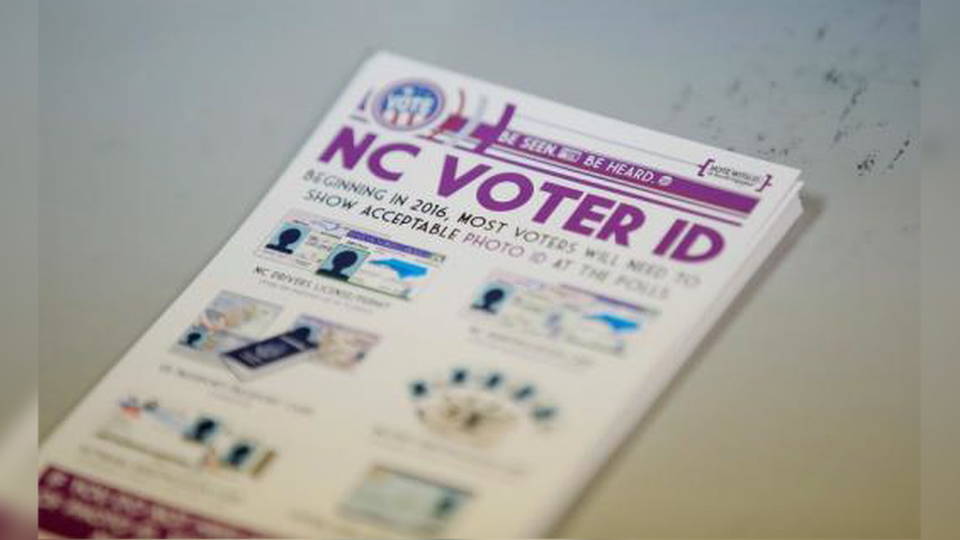
A federal appeals court has struck down voting restrictions in North Carolina, saying they "disproportionately affected African Americans." In the ruling, the three-judge panel from the Fourth Circuit Court wrote, "The new provisions target African Americans with almost surgical precision." The law had been challenged by the Justice Department, the North Carolina NAACP and other civil rights groups after its passage in 2013 limited the forms of ID acceptable at polling places and restricted how people could register. As a result, about 5 percent of the state’s registered voters, primarily African Americans, would have been excluded from being able to cast a ballot. This is Bob Hall, executive director of Democracy North Carolina, speaking on Democracy Now! about how the rules affected North Carolina’s presidential primaries earlier this year.
Bob Hall: "You could see that with same-day registration we had over 8,000 voters able to vote, able to use same-day registration. That is, they were not registered, but they showed up during early voting, and they were able to use that provision to vote. It’s disproportionately African-American, disproportionately young people. They want to get rid of that."
TOPICS:
Voting
2016 Election
Judge Strikes Down Wisconsin Voter ID Laws
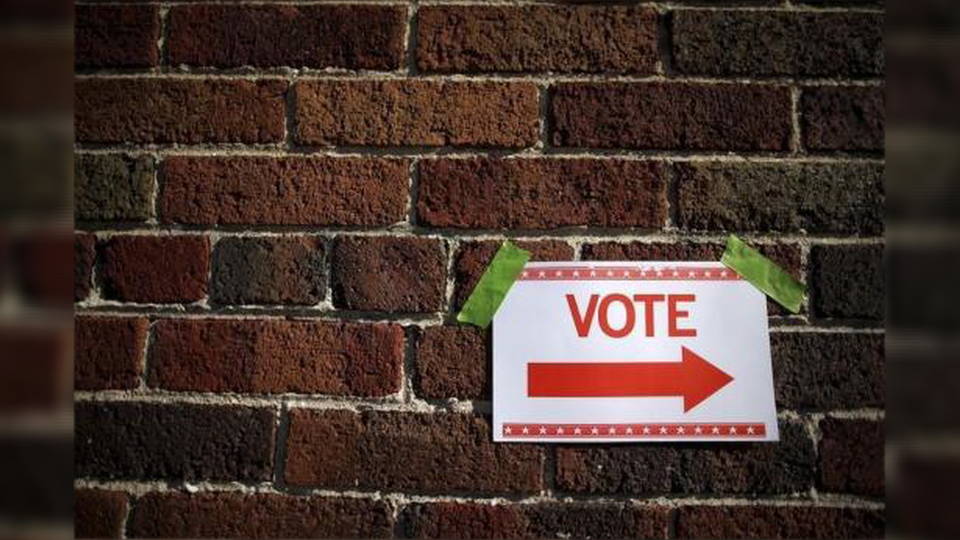
Meanwhile, in Wisconsin, a federal judge has overturned similar election laws there, finding they disenfranchised voters of color and were tailored to benefit the Republican politicians who enacted them. U.S. District Judge James Peterson wrote in his opinion, "The Wisconsin experience demonstrates that a preoccupation with mostly phantom election fraud leads to real incidents of disenfranchisement, which undermine rather than enhance confidence in elections, particularly in minority communities." Peterson did not overturn a photo ID provision for voters in the state, but called the current system for issuing IDs a "wretched failure" that predominantly affected African-American and Latino citizens. On Friday, a court also ruled against Republican voting laws in Kansas, where a county judge said the state must count votes cast by people who registered without providing citizenship documents. Those decisions all come a week after a similar ruling against a voter ID law in Texas. We’ll have more on the rulings after headlines.
TOPICS:
Voting
2016 Election
Trump Attacks Mother of Muslim Soldier Who Died in Iraq
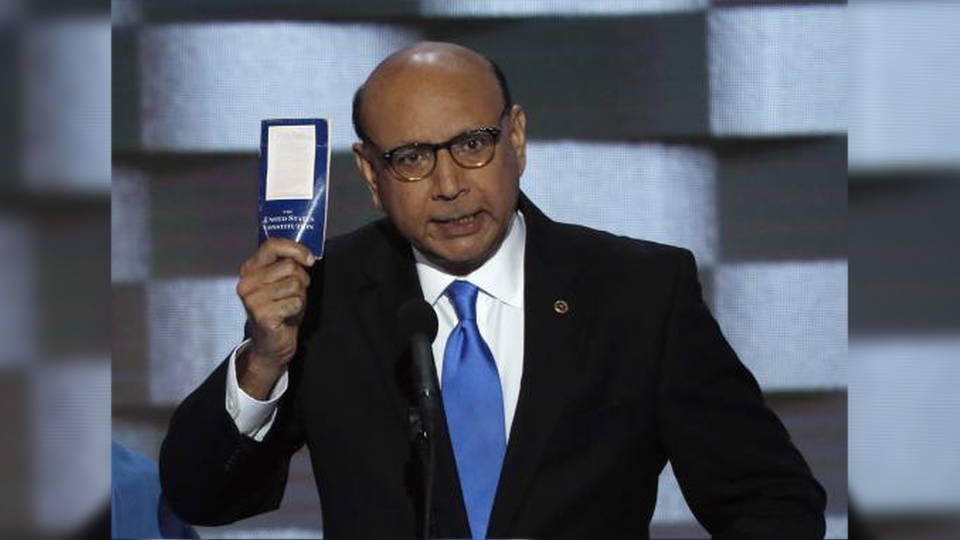
In election news, Khizr and Ghazala Khan, the parents of a U.S. soldier who died serving in Iraq, are denouncing Donald Trump, who attacked them following Khizr’s speech at the Democratic National Convention. This is Khizr Khan speaking Thursday night in Philadelphia.
Khizr Khan: "Donald Trump, you’re asking Americans to trust you with their future. Let me ask you: Have you even read the United States Constitution? I will gladly lend you my copy."
That was Khizr Khan speaking onstage beside his wife, Ghazala Khan. Their son, U.S. Army Captain Humayun Khan, was posthumously awarded the Bronze Star and Purple Heart after he was killed in 2004 serving in Iraq. In response to Khan’s speech, Donald Trump made fun of his wife, Ghazala Khan, while speaking Sunday on ABC:
Donald Trump: "I saw him. He was, you know, very emotional and probably looked like a nice guy to me. His wife, if you look at his wife, she was standing there. She had nothing to say. She probably—maybe she wasn’t allowed to have anything to say. You tell me. But plenty of people have written that."
That was Donald Trump speaking Sunday. Later, Khizr Khan responded to Trump.
Khizr Khan: "He is a black soul, and this is totally unfit for the leadership of this beautiful country. The love and affection that we have received affirms that our beliefs—our experience in this country had been correct and positive. The world is receiving us like we have never seen. They have seen the blackness of his character, of his soul."
TOPICS:
2016 Election
Donald Trump
Trump Continues to Argue Against NATO
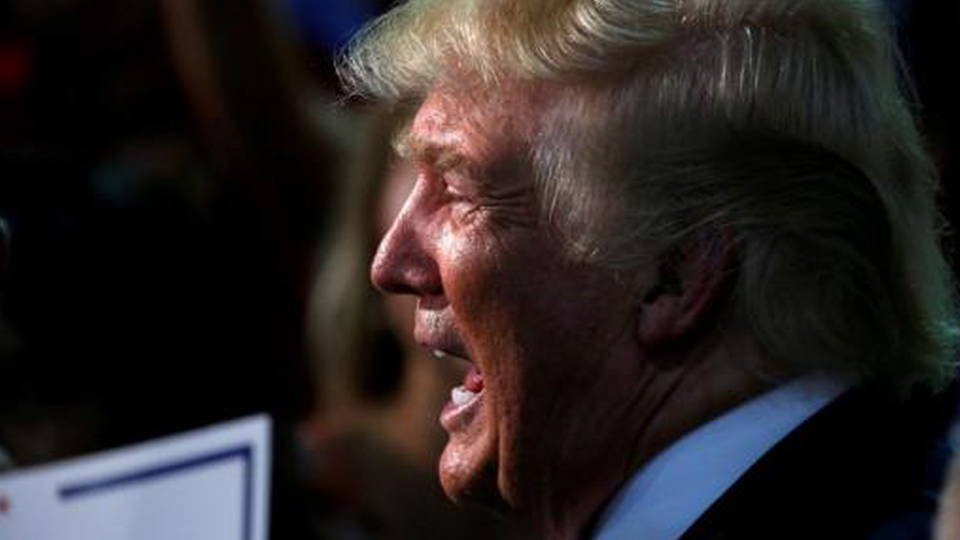
Meanwhile, Donald Trump has continued to argue that NATO has become obsolete. Speaking to ABC’s George Stephanopoulos on Sunday, Trump said NATO had been unable to stop Russia’s annexation of Crimea last year. Trump also said that, if elected, he might formally recognize Russia’s takeover of Crimea.
Donald Trump: "I’m going to take a look at it. But, you know, the people of Crimea, from what I’ve heard, would rather be with Russia than where they were. And you have to look at that also. Now, that was under—just so you understand, that was done under Obama’s administration. And as far as the Ukraine is concerned, it’s a mess. And that’s under the Obama administration, with his strong ties toNATO."
Some Democratic Party officials have suggested Russia is behind the release of Democratic Party emails in an effort to help sway the election to Trump, but no evidence to back the claim has been provided.
TOPICS:
Donald Trump
NATO
Six More Michigan State Employees Charged in Flint Water Poisoning
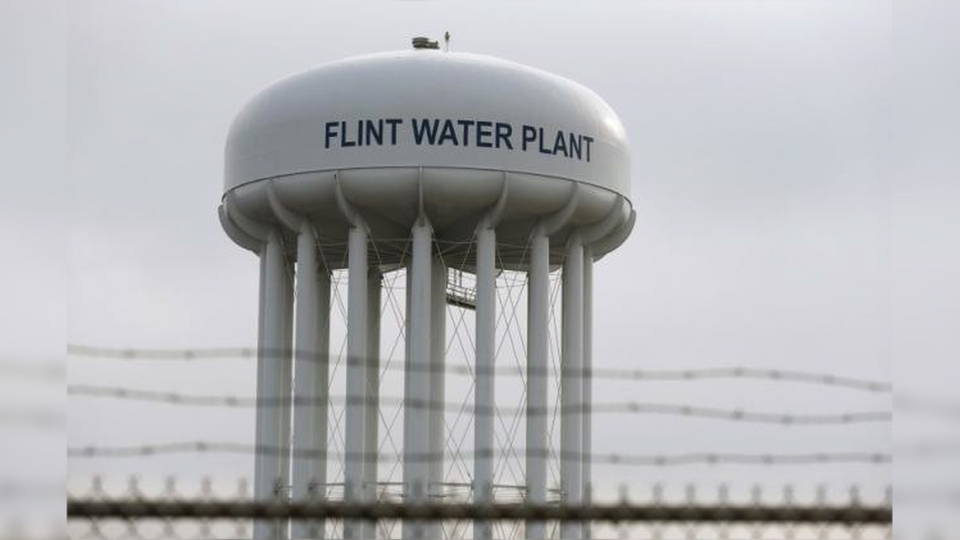
In Flint, Michigan, six more state employees are facing criminal charges in connection to the lead poisoning of Flint’s water. The six work for the Michigan Department of Health and Human Services and the Michigan Department of Environmental Quality. They are accused of having tried to cover up the problem of lead contamination in Flint’s water once state officials became aware of it. This is Michigan Attorney General Bill Schuette.
Attorney General Bill Schuette: "Some people failed to act. Others minimized harm done and arrogantly chose to ignore data. Some intentionally altered figures and covered up, and covered up significant health risks. Two companies—two companies committed fraud and were negligent and made a bad situation worse."
Three other state and city officials also face felony charges in the case. Flint’s lead poisoning began last year when an unelected emergency manager appointed by Michigan Governor Rick Snyder switched the source of the city’s drinking water to the corrosive Flint River. Today, the water in Flint is still poisoned and unsafe to drink.
TOPICS:
Flint Water Crisis
Former Fox News Employee Claims 20 Years of Harassment by Roger Ailes
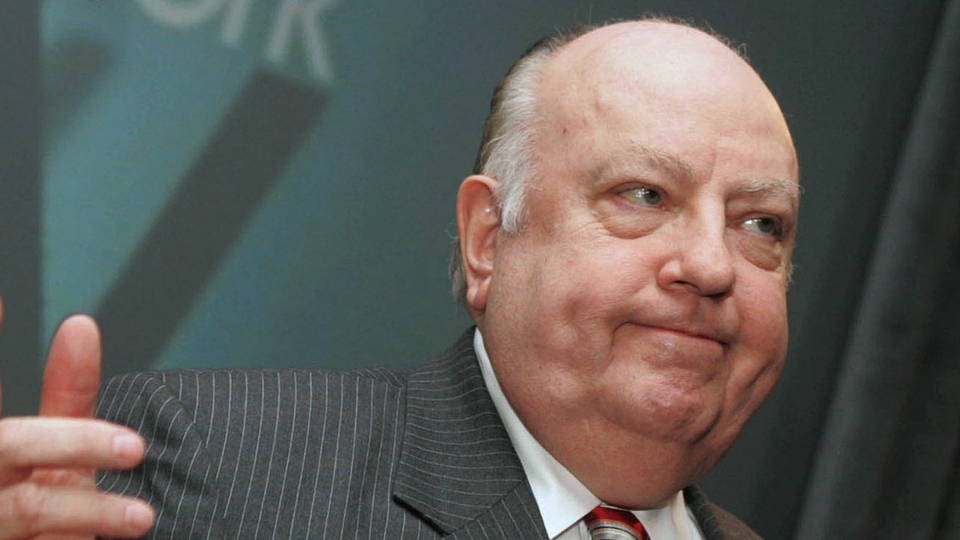
The former head of booking at Fox News says former CEO Roger Ailes sexually harassed her for two decades. Ailes resigned last week amid multiple claims of sexual harassment. Laurie Luhn told New York Magazine that Fox News knew about the harassment and helped cover it up. Luhn said the harassment amounted to psychological torture and "ruined her life." Luhn called Ailes a "predator" and said her duties included luring young female Fox employees into one-on-one situations with Ailes that she knew could result in harassment.
Syria: Demonstrations in Aleppo as 250,000 Trapped by Siege

In international news, hundreds of residents of the Syrian city of Aleppo demonstrated and burned tires Sunday to protest the ongoing siege by Syrian government forces and their allies. The demonstration took place shortly before rebels fighting the Syrian government began a new offensive to break the siege. The U.N. says about a quarter-million civilians are trapped in the rebel-held portion of Aleppo and facing a worsening humanitarian situation. Rebel-held areas of the city have been surrounded by government forces since last month and subjected to heavy aerial bombardment, including the destruction of a number of hospitals.
TOPICS:
Syria
WikiLeaks Founder Promises More Revelations About DNC
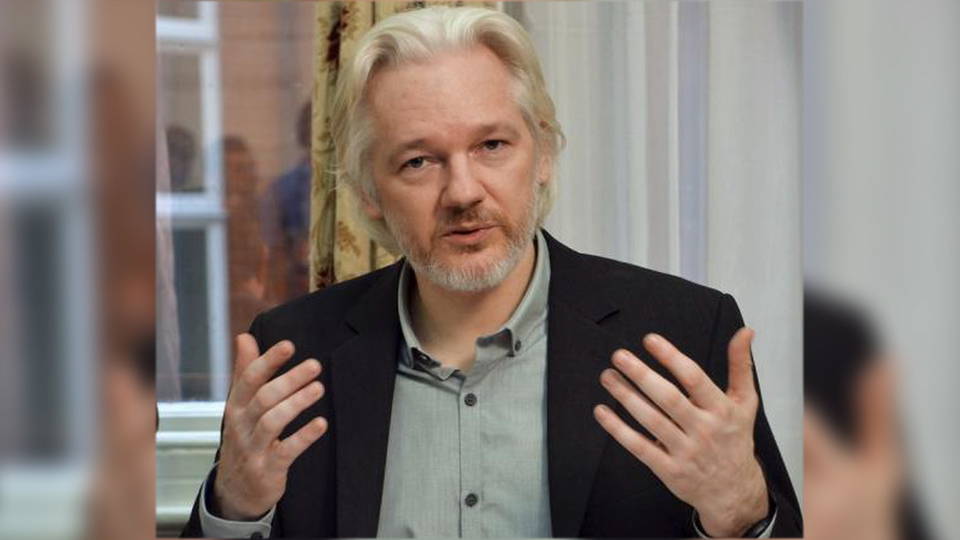
WikiLeaks founder Julian Assange says the group has more information about Hillary Clinton’s campaign that has not yet been released. This comes after WikiLeaks released 20,000 DNC emails revealing how the Democratic Party favored Hillary Clinton and worked behind the scenes to discredit and defeat Bernie Sanders. DNCChair Debbie Wasserman Schultz resigned as a result of the leaks.
TOPICS:
WikiLeaks
In a First, Canadian Judge Rules Police Entrapped Terrorism Suspects
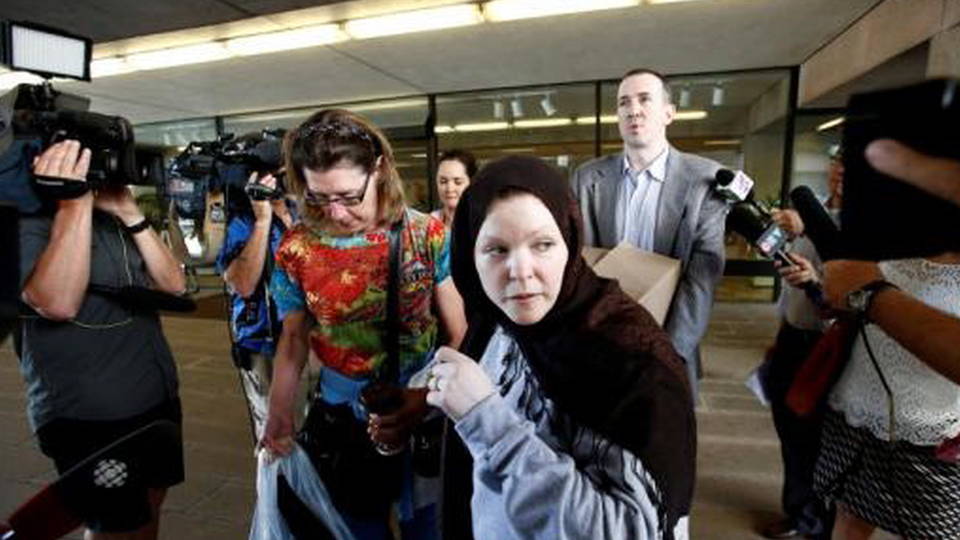
Two Canadians were rearrested on Friday just hours after the Supreme Court of British Columbia cleared them of terrorism charges. Civil liberties groups hailed the ruling that freed John Nuttall and Amanda Korody after a judge declared federal police had entrapped them. It was the first time entrapment has been successfully used as a defense in a terrorism prosecution in North America. Civil rights groups accuse the FBI of similarly entrapping terrorism suspects in the U.S. But on Friday, Nuttal and Korody were rearrested on a peace bond, a Canadian law that allows authorities to monitor or detain people who it thinks may commit a crime.
TOPICS:
War on Terror
Baltimore City Council Slated to Vote on $15 Minimum Wage
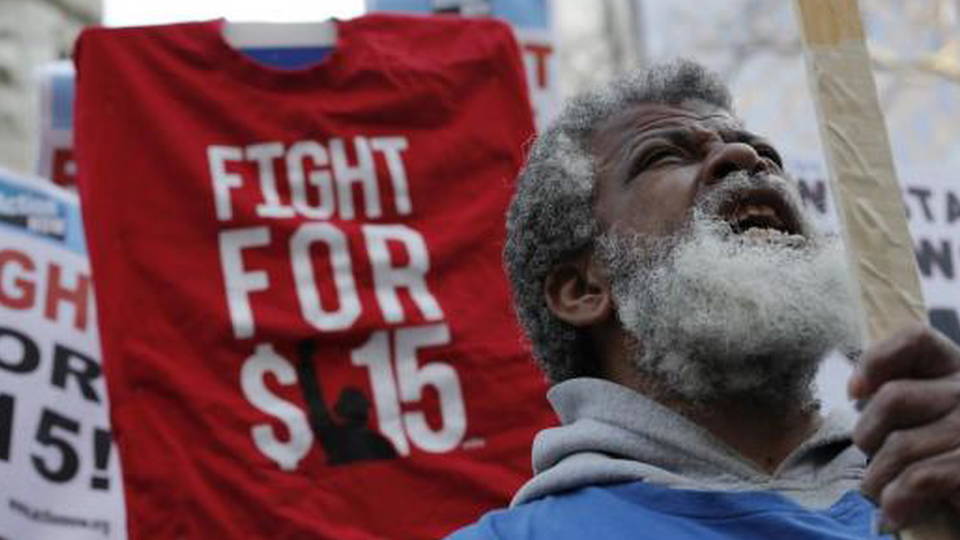
The Baltimore City Council will decide next month whether to increase the city’s minimum wage to $15 an hour. The council’s labor committee voted 4-0 last week to send the bill to the 15-member council. Mayor Stephanie Rawlings-Blake has said she would sign the bill if it reaches her desk. The city is the latest jurisdiction nationwide to consider an increase. Washington, D.C., Seattle and San Francisco have approved increases to $15 an hour. California and New York have approved statewide increases to $15. Baltimore workers are presently subject to the state minimum wage, which is $8.75.
KY Judge Scolds Jail Officials After Woman Comes to Court Without Pants
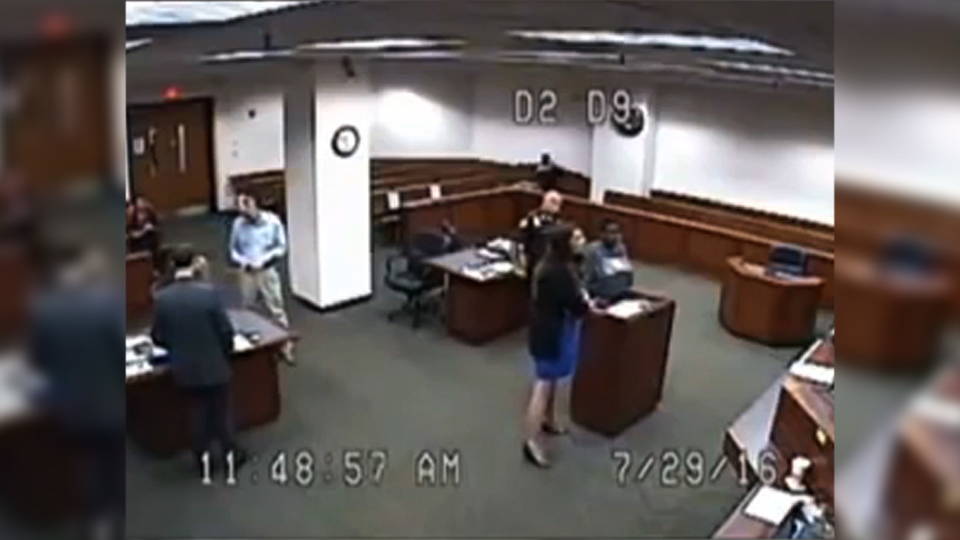
A judge publicly reprimanded jail officials in Louisville, Kentucky, Friday, after they sent a woman into her courtroom with no pants last week. The woman said she was arrested in a county 80 miles away on a bench warrant for not completing a shoplifting intervention course in 2014. The woman said she had been in jail since Sunday—five days before she appeared in the courtroom of Judge Amber Wolf.
Lawyer: "The jail would also refuse to give her pants and any kind of hygiene products that she needed."
Judge Amber Wolf: "No Pants? What?"
Woman: "I’ve been wearing this since I came in with this on Sunday."
Judge Amber Wolf: "Excuse me?"
Lawyer: "And not other hygiene products that she greatly needed and requested."
Judge Amber Wolf: "Excuse me? This is outrageous. Is this for real?"
Wolf then called officials at the Jefferson County Jail directly from the courtroom and reprimanded them. The woman also told Wolf other women in the jail had received similar treatment.
Mexico Marks 1 Year Since Murder of Journalist Rubén Espinosa
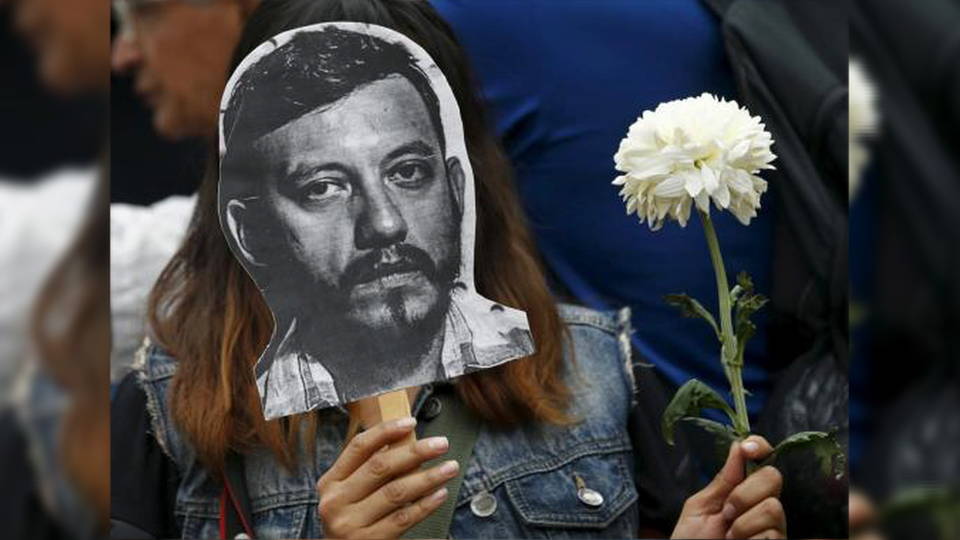
And Sunday was the first anniversary of the murder of Mexican journalist Rubén Espinosa. On July 31, 2015, Espinosa was killed by gunmen in an apartment in Mexico City, alongside human rights activist Nadia Vera and three other women. No one has been charged in their murders. It’s widely believed Espinosa and Vera were targeted as a result of their work in the southern state of Veracruz. This is Rubén’s sister, Alma Espinosa, speaking Sunday.
Alma Espinosa: "My brother Rubén was a photojournalist who loved his work, and he was a very humane person. We aren’t insisting their assassination was planned from Veracruz, but we do want this line of investigation to be pursued related to Rubén’s work and Nadia’s activism, since they both had suffered harassment in Xalapa. And we also want them to investigate this, since, apart from him, they have killed many journalists in the state of Veracruz. There are so many who have died, and no one pays attention. They are killing them, and no one does anything."
TOPICS:
Mexico
Donate today:
Follow:



COLUMN
Federal Judges Strike Down Racist Voting Restrictions in NC

A federal appeals court has struck down voting restrictions in North Carolina, saying they "disproportionately affected African Americans." In the ruling, the three-judge panel from the Fourth Circuit Court wrote, "The new provisions target African Americans with almost surgical precision." The law had been challenged by the Justice Department, the North Carolina NAACP and other civil rights groups after its passage in 2013 limited the forms of ID acceptable at polling places and restricted how people could register. As a result, about 5 percent of the state’s registered voters, primarily African Americans, would have been excluded from being able to cast a ballot. This is Bob Hall, executive director of Democracy North Carolina, speaking on Democracy Now! about how the rules affected North Carolina’s presidential primaries earlier this year.
Bob Hall: "You could see that with same-day registration we had over 8,000 voters able to vote, able to use same-day registration. That is, they were not registered, but they showed up during early voting, and they were able to use that provision to vote. It’s disproportionately African-American, disproportionately young people. They want to get rid of that."
TOPICS:
Voting
2016 Election
Judge Strikes Down Wisconsin Voter ID Laws

Meanwhile, in Wisconsin, a federal judge has overturned similar election laws there, finding they disenfranchised voters of color and were tailored to benefit the Republican politicians who enacted them. U.S. District Judge James Peterson wrote in his opinion, "The Wisconsin experience demonstrates that a preoccupation with mostly phantom election fraud leads to real incidents of disenfranchisement, which undermine rather than enhance confidence in elections, particularly in minority communities." Peterson did not overturn a photo ID provision for voters in the state, but called the current system for issuing IDs a "wretched failure" that predominantly affected African-American and Latino citizens. On Friday, a court also ruled against Republican voting laws in Kansas, where a county judge said the state must count votes cast by people who registered without providing citizenship documents. Those decisions all come a week after a similar ruling against a voter ID law in Texas. We’ll have more on the rulings after headlines.
TOPICS:
Voting
2016 Election
Trump Attacks Mother of Muslim Soldier Who Died in Iraq

In election news, Khizr and Ghazala Khan, the parents of a U.S. soldier who died serving in Iraq, are denouncing Donald Trump, who attacked them following Khizr’s speech at the Democratic National Convention. This is Khizr Khan speaking Thursday night in Philadelphia.
Khizr Khan: "Donald Trump, you’re asking Americans to trust you with their future. Let me ask you: Have you even read the United States Constitution? I will gladly lend you my copy."
That was Khizr Khan speaking onstage beside his wife, Ghazala Khan. Their son, U.S. Army Captain Humayun Khan, was posthumously awarded the Bronze Star and Purple Heart after he was killed in 2004 serving in Iraq. In response to Khan’s speech, Donald Trump made fun of his wife, Ghazala Khan, while speaking Sunday on ABC:
Donald Trump: "I saw him. He was, you know, very emotional and probably looked like a nice guy to me. His wife, if you look at his wife, she was standing there. She had nothing to say. She probably—maybe she wasn’t allowed to have anything to say. You tell me. But plenty of people have written that."
That was Donald Trump speaking Sunday. Later, Khizr Khan responded to Trump.
Khizr Khan: "He is a black soul, and this is totally unfit for the leadership of this beautiful country. The love and affection that we have received affirms that our beliefs—our experience in this country had been correct and positive. The world is receiving us like we have never seen. They have seen the blackness of his character, of his soul."
TOPICS:
2016 Election
Donald Trump
Trump Continues to Argue Against NATO

Meanwhile, Donald Trump has continued to argue that NATO has become obsolete. Speaking to ABC’s George Stephanopoulos on Sunday, Trump said NATO had been unable to stop Russia’s annexation of Crimea last year. Trump also said that, if elected, he might formally recognize Russia’s takeover of Crimea.
Donald Trump: "I’m going to take a look at it. But, you know, the people of Crimea, from what I’ve heard, would rather be with Russia than where they were. And you have to look at that also. Now, that was under—just so you understand, that was done under Obama’s administration. And as far as the Ukraine is concerned, it’s a mess. And that’s under the Obama administration, with his strong ties toNATO."
Some Democratic Party officials have suggested Russia is behind the release of Democratic Party emails in an effort to help sway the election to Trump, but no evidence to back the claim has been provided.
TOPICS:
Donald Trump
NATO
Six More Michigan State Employees Charged in Flint Water Poisoning

In Flint, Michigan, six more state employees are facing criminal charges in connection to the lead poisoning of Flint’s water. The six work for the Michigan Department of Health and Human Services and the Michigan Department of Environmental Quality. They are accused of having tried to cover up the problem of lead contamination in Flint’s water once state officials became aware of it. This is Michigan Attorney General Bill Schuette.
Attorney General Bill Schuette: "Some people failed to act. Others minimized harm done and arrogantly chose to ignore data. Some intentionally altered figures and covered up, and covered up significant health risks. Two companies—two companies committed fraud and were negligent and made a bad situation worse."
Three other state and city officials also face felony charges in the case. Flint’s lead poisoning began last year when an unelected emergency manager appointed by Michigan Governor Rick Snyder switched the source of the city’s drinking water to the corrosive Flint River. Today, the water in Flint is still poisoned and unsafe to drink.
TOPICS:
Flint Water Crisis
Former Fox News Employee Claims 20 Years of Harassment by Roger Ailes

The former head of booking at Fox News says former CEO Roger Ailes sexually harassed her for two decades. Ailes resigned last week amid multiple claims of sexual harassment. Laurie Luhn told New York Magazine that Fox News knew about the harassment and helped cover it up. Luhn said the harassment amounted to psychological torture and "ruined her life." Luhn called Ailes a "predator" and said her duties included luring young female Fox employees into one-on-one situations with Ailes that she knew could result in harassment.
Syria: Demonstrations in Aleppo as 250,000 Trapped by Siege

In international news, hundreds of residents of the Syrian city of Aleppo demonstrated and burned tires Sunday to protest the ongoing siege by Syrian government forces and their allies. The demonstration took place shortly before rebels fighting the Syrian government began a new offensive to break the siege. The U.N. says about a quarter-million civilians are trapped in the rebel-held portion of Aleppo and facing a worsening humanitarian situation. Rebel-held areas of the city have been surrounded by government forces since last month and subjected to heavy aerial bombardment, including the destruction of a number of hospitals.
TOPICS:
Syria
WikiLeaks Founder Promises More Revelations About DNC

WikiLeaks founder Julian Assange says the group has more information about Hillary Clinton’s campaign that has not yet been released. This comes after WikiLeaks released 20,000 DNC emails revealing how the Democratic Party favored Hillary Clinton and worked behind the scenes to discredit and defeat Bernie Sanders. DNCChair Debbie Wasserman Schultz resigned as a result of the leaks.
TOPICS:
WikiLeaks
In a First, Canadian Judge Rules Police Entrapped Terrorism Suspects

Two Canadians were rearrested on Friday just hours after the Supreme Court of British Columbia cleared them of terrorism charges. Civil liberties groups hailed the ruling that freed John Nuttall and Amanda Korody after a judge declared federal police had entrapped them. It was the first time entrapment has been successfully used as a defense in a terrorism prosecution in North America. Civil rights groups accuse the FBI of similarly entrapping terrorism suspects in the U.S. But on Friday, Nuttal and Korody were rearrested on a peace bond, a Canadian law that allows authorities to monitor or detain people who it thinks may commit a crime.
TOPICS:
War on Terror
Baltimore City Council Slated to Vote on $15 Minimum Wage

The Baltimore City Council will decide next month whether to increase the city’s minimum wage to $15 an hour. The council’s labor committee voted 4-0 last week to send the bill to the 15-member council. Mayor Stephanie Rawlings-Blake has said she would sign the bill if it reaches her desk. The city is the latest jurisdiction nationwide to consider an increase. Washington, D.C., Seattle and San Francisco have approved increases to $15 an hour. California and New York have approved statewide increases to $15. Baltimore workers are presently subject to the state minimum wage, which is $8.75.
KY Judge Scolds Jail Officials After Woman Comes to Court Without Pants

A judge publicly reprimanded jail officials in Louisville, Kentucky, Friday, after they sent a woman into her courtroom with no pants last week. The woman said she was arrested in a county 80 miles away on a bench warrant for not completing a shoplifting intervention course in 2014. The woman said she had been in jail since Sunday—five days before she appeared in the courtroom of Judge Amber Wolf.
Lawyer: "The jail would also refuse to give her pants and any kind of hygiene products that she needed."
Judge Amber Wolf: "No Pants? What?"
Woman: "I’ve been wearing this since I came in with this on Sunday."
Judge Amber Wolf: "Excuse me?"
Lawyer: "And not other hygiene products that she greatly needed and requested."
Judge Amber Wolf: "Excuse me? This is outrageous. Is this for real?"
Wolf then called officials at the Jefferson County Jail directly from the courtroom and reprimanded them. The woman also told Wolf other women in the jail had received similar treatment.
Mexico Marks 1 Year Since Murder of Journalist Rubén Espinosa

And Sunday was the first anniversary of the murder of Mexican journalist Rubén Espinosa. On July 31, 2015, Espinosa was killed by gunmen in an apartment in Mexico City, alongside human rights activist Nadia Vera and three other women. No one has been charged in their murders. It’s widely believed Espinosa and Vera were targeted as a result of their work in the southern state of Veracruz. This is Rubén’s sister, Alma Espinosa, speaking Sunday.
Alma Espinosa: "My brother Rubén was a photojournalist who loved his work, and he was a very humane person. We aren’t insisting their assassination was planned from Veracruz, but we do want this line of investigation to be pursued related to Rubén’s work and Nadia’s activism, since they both had suffered harassment in Xalapa. And we also want them to investigate this, since, apart from him, they have killed many journalists in the state of Veracruz. There are so many who have died, and no one pays attention. They are killing them, and no one does anything."
TOPICS:
Mexico
Donate today:
Follow:




COLUMN

Sanders Supporters Say DNC's Treatment of Surrogate Nina Turner Makes Calls for Unity "Fall Flat"
NEW BOOK

Congressman Elijah Cummings on Freddie Gray Case: I'm for Accountability, Not Against Police
WORK WITH DN!

Senior TV Producer
Development Manager
207 West 25th Street, 11th Floor
New York, New York 10001, United States
----------------------------
----------------------------


No comments:
Post a Comment